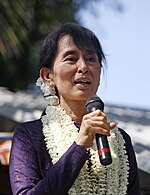National League for Democracy
| National League for Democracy | |
|---|---|

|
|

|
|
| Party leader | Aung San Suu Kyi |
| Deputy Chairman | Tin Oo |
| founding | September 27, 1988 |
| Headquarters | Rangoon |
| Alignment |
Social Democracy Progressivism |
| Colours) | red |
| International connections |
Progressive Alliance (full member) Socialist International (full member) |
| Website | www.nldofficial.org |
The National League for Democracy ( NLD ; Burmese အမျိုးသား ဒီမိုကရေစီအဖွဲ့ချုပ် , English National League for Democracy , German also Nationalliga für Demokratie ) is a political party in Myanmar and was the leading opposition party against the country's military junta . It was founded after the violent suppression of the popular uprisings of August 8, 1988 and General Saw Maung's military coup on September 27 of the same year.
In the parliamentary elections in 1990 , the NLD received 406 of 489 seats, but the military junta refused to hand over power on the pretext that a new constitution would first be drawn up before the newly elected parliament could meet.
The party is chaired by U Aung Shwe , a diplomat who was ambassador to various countries from 1961 to 1975 during the Ne Win era. Deputy chairman is U Tin Oo (born March 12, 1927 in Pathein ), from 1974 to 1976 general, commander in chief and defense minister of the military dictatorship in the Socialist Federal Republic of Myanmar. Nobel Peace Prize winner Aung San Suu Kyi is the party's general secretary .
The NLD provides members of the organizations in exile, Committee Representing People's Parliament (CRPP) and National Coalition Government of the Union of Burma (NCGUB) .
In 2001 the military junta, under great propaganda, allowed NLD offices to reopen across the country. Given the continued popularity of NLD and Aung San Suu Kyi, they were closed again after the attack in May 2003, except for the office in the capital, Rangoon . In the course of the change of course, which culminated in the disempowerment of Prime Minister General Khin Nyunt, who was ready to enter into dialogue with the opposition , the reprisals against the NLD were intensified. Before the parliamentary elections in November 2010 , the party leadership was forced by the military junta to expel its former top candidate Aung San Suu Kyi . The NLD therefore called for a boycott of the elections.
A grouping with a similar name is the National League for Democracy-Liberated Areas (NLD-LA) . It is an independent splinter group that acts militarily against the Myanmar army in the border areas with Thailand . It is also referred to as the Democratic Party in western media and took part in the elections.
On September 14, 2010, the party was dissolved by the state electoral commission after the former waived re-registration for the upcoming elections . Some of its members, who opposed the boycott of the 2010 elections, founded the National Democratic Force (NDF) party, which took part in the elections despite all the repression by the junta. The largely controlled elections brought the two opposition parties, which were barely allowed to provide 10% of the 3,100 candidates and criticized the elections as a fraud, but only moderate success. Of the 330 elected MPs from both chambers, they won around 30-40, but this was not broken down in the (Chinese) reports. A member of the NDF changed sides and was the only one to sit in parliament for the NLD, which had not yet been formally legalized again at the time.
In the run-up to the 2012 by-elections , the NLD had to re-register; its re-admission was ordered on December 13, 2011 by the state election commission. Aung San Suu Kyi had previously been released from years of house arrest by reform-minded President Thein Sein , who won the 2010 elections. Of the 45 vacant seats in both chambers that were newly filled, the NLD won an overwhelming majority of 43 seats and was represented in parliament for the first time, except for the one existing member.
In the regular parliamentary elections that took place on November 8, 2015, the NLD won the absolute majority of the 657-seat lower and upper house with almost two thirds of the votes, even though only 75% of the seats were up for election, like the electoral commission before all votes were counted announced. The military had secured a quarter of the parliamentary seats in the run-up to the election.
Web links
Individual evidence
- ↑ http://www.broadleft.org/mm.htm
- ↑ http://progressive-alliance.info/participants-3/
- ↑ http://www.socialistinternational.org/viewArticle.cfm?ArticleID=282
- ↑ La Birmanie dissout cinq vieux partis politiques ( Memento of the original dated December 8, 2015 in the Internet Archive ) Info: The archive link was automatically inserted and not yet checked. Please check the original and archive link according to the instructions and then remove this notice. , Xinhua
- ↑ Background to the elections in Myanmar: Burma's military are cementing their power . Deutschlandfunk November 5, 2010
- ↑ Myanmar election shows trend of people's aspiration , Xinhua
- ^ Opposition in Burma speaks of defeat and fraud NZZ Online from November 9, 2010
- ↑ Weltbilder contribution from February 7th, accessed on February 15, 2012
- ↑ Suu Kyi for parliamentary elections ( Memento from November 24, 2011 in the Internet Archive )
- ↑ Parliamentary election in Burma: Suu Kyi wins an absolute majority in Spiegel Online , November 13, 2015 (accessed November 13, 2015).
- ↑ Myanmar: San Suu Kyi wins absolute majority at zeit.de, November 13, 2015 (accessed November 13, 2015).